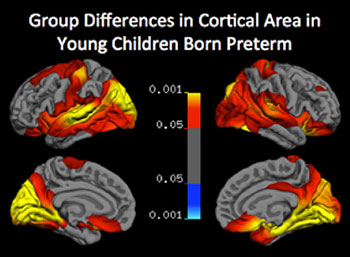Preterm Babies at Risk for Later Cognitive Difficulties
$3 Million NIH grant will fund impact of preterm birth on early cognitive development and academic measures
By:
- Debra Kain
Published Date
By:
- Debra Kain
Share This:
Article Content
Researchers at the University of California, San Diego have received a five-year, $3 million grant from the Eunice Kennedy Shriver Institute of Child Health and Human Development, part of the National Institutes of Health (NIH). The grant will fund a longitudinal study designed to track the developmental trajectory in cognitive, academic and brain measures as very preterm children transition from preschool to grade school. Results will provide the foundation for designing appropriate learning interventions.

“Even healthy preterm babies are at high risk for lower academic achievement, especially in math,” said Natacha Akshoomoff, PhD, of the Department of Psychiatry and UC San Diego’s Center for Human Development.
Preterm children who are deemed “normal” in terms of their development at infant/toddler stages may still remain at risk for significant math difficulties, as well as deficits in attention, executive functions, and spatial skills.
“Recent studies have identified a common pattern of subtle abnormality in the deep white matter of the brain among children born very premature. These early abnormalities may affect the subsequent development of widely distributed brain areas, and may account for the patterns of cognitive deficit that are observed later in childhood,” said Akshoomoff. “However, there is currently very little data actually linking these neural abnormalities with the emergence of such deficits and associated early academic difficulties. The goal of the current study is to provide these essential data as children enter a critical developmental stage when intervention may have the best potential to achieve better outcomes for these children.”
Akshoomoff and a multidisciplinary team of investigators will utilize MRI imaging techniques to study links between affected brain areas and pathways and levels of performance on a set of neurocognitive and math functions. Participants will include 60 healthy children born at 25 to 32 gestational weeks with average intelligence, and 40 full-term children matched for age, sex and verbal IQ. Children will enter the study within six months of entering kindergarten and will be followed for three years. The scientists predict that specific early perceptual and cognitive deficits will be related to math deficits that emerge as children start school.
Their hope is that their results will greatly enhance understanding of why certain skills appear more vulnerable to preterm birth, how this relates to early math deficiency, and how changes seen in the brain account for neurodevelopment outcomes in healthy preterm children.
“This is not meant to frighten parents of children born preterm, but to alert them of potential cognitive or behavior problems that – with early intervention – can be mitigated,” said Akshoomoff.
For more information, visit http://chd.ucsd.edu/
Additional collaborators on the UC San Diego study include Terry Jernigan (Center for Human Development, Departments of Cognitive Science, Psychiatry, and Radiology); Joan Stiles (Center for Human Development and Department of Cognitive Science); Yvonne Vaucher and Martha Fuller (Neonatology/Pediatrics); Timothy Brown (Neurosciences); Anders Dale (Radiology); Wesley Thompson (Psychiatry); and John Hesselink (Radiology); as well as Judy Reilly (Psychology, San Diego State University); and Janette Atkinson and Oliver Braddick (University College of London and University of Oxford).
The study is supported by NIH grant # 1 R01HD075865-01 A1.
Share This:
You May Also Like
Stay in the Know
Keep up with all the latest from UC San Diego. Subscribe to the newsletter today.



